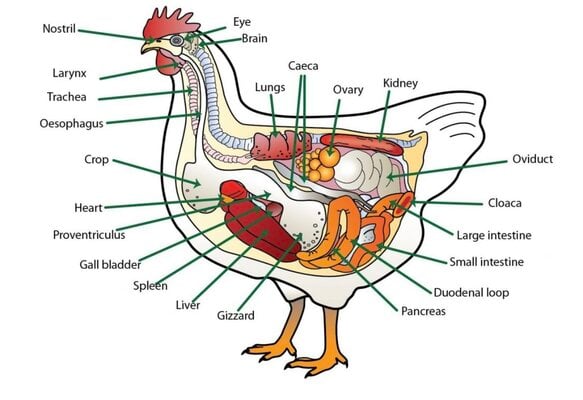Sour crop is an common ailment in poultry. It is caused by a yeast infection inside the crop that produces inflammation and causes discomfort to the bird. This condition can be referred to as thrush, and can be treated.
Symptoms
• The crop is bulging and feels similar to a water ballon. Gentle palpitations and picking up the hen can cause fluid to exit her beak.
• Classic sour crop can emit a foul smell coming from the hens beak. Vomit may look brown, but this is not always the case.
• The hen may shake or flick her head excessively.
Causes
• Moldy and damp feed or scratch
• Finishing a course of antibiotics
• An underlying issue can cause sour crop and if not resolved, sour crop can reoccur after treatment.
Treatment
1. Seek veterinary help.
2. If veterinary help is not available to you, try one of the methods below.
1. Stop food and but allow fresh, cool water for 24 hours to allow the crop to empty without intervention and allow sitting food to pass.
2. After the hen has been 24 hours without feed, give an apple cider vinegar ( diluted to bottles ratio ) and syringe into the left side of the hens beak. Syringing into the left side is important to avoid the lungs. Gently massage the crop after administering the liquid. Repeat every few hours.
3. After 12 hours of administering, allow a very small amount of water and a teaspoon of softened food.
4. Regularly check on the hen and slowly allow more feed and water.
5. If there is no underlying issue, check your other birds for this condition. Check your feed bags aren’t damp and are free of mold, and wash out your feeders and waterers in case there's built up baterica causing illness.
Prevention
Prevention is always better than treatment.
• Store your feed in clean, rodent, and weather proof containers or large trash cans with a tight fitting lid. We use deck bins with a lock to keep closed on windy days.
• Use poultry safe probiotic following antibiotic courses
• Clean feeders and waterers frequently.
* None of this is meant to replace veterinary advice or help. It is meant for information and to help poultry keepers unavailable to vet care.
Symptoms
• The crop is bulging and feels similar to a water ballon. Gentle palpitations and picking up the hen can cause fluid to exit her beak.
• Classic sour crop can emit a foul smell coming from the hens beak. Vomit may look brown, but this is not always the case.
• The hen may shake or flick her head excessively.
Causes
• Moldy and damp feed or scratch
• Finishing a course of antibiotics
• An underlying issue can cause sour crop and if not resolved, sour crop can reoccur after treatment.
Treatment
1. Seek veterinary help.
2. If veterinary help is not available to you, try one of the methods below.
1. Stop food and but allow fresh, cool water for 24 hours to allow the crop to empty without intervention and allow sitting food to pass.
2. After the hen has been 24 hours without feed, give an apple cider vinegar ( diluted to bottles ratio ) and syringe into the left side of the hens beak. Syringing into the left side is important to avoid the lungs. Gently massage the crop after administering the liquid. Repeat every few hours.
3. After 12 hours of administering, allow a very small amount of water and a teaspoon of softened food.
4. Regularly check on the hen and slowly allow more feed and water.
5. If there is no underlying issue, check your other birds for this condition. Check your feed bags aren’t damp and are free of mold, and wash out your feeders and waterers in case there's built up baterica causing illness.
Prevention
Prevention is always better than treatment.
• Store your feed in clean, rodent, and weather proof containers or large trash cans with a tight fitting lid. We use deck bins with a lock to keep closed on windy days.
• Use poultry safe probiotic following antibiotic courses
• Clean feeders and waterers frequently.
* None of this is meant to replace veterinary advice or help. It is meant for information and to help poultry keepers unavailable to vet care.

